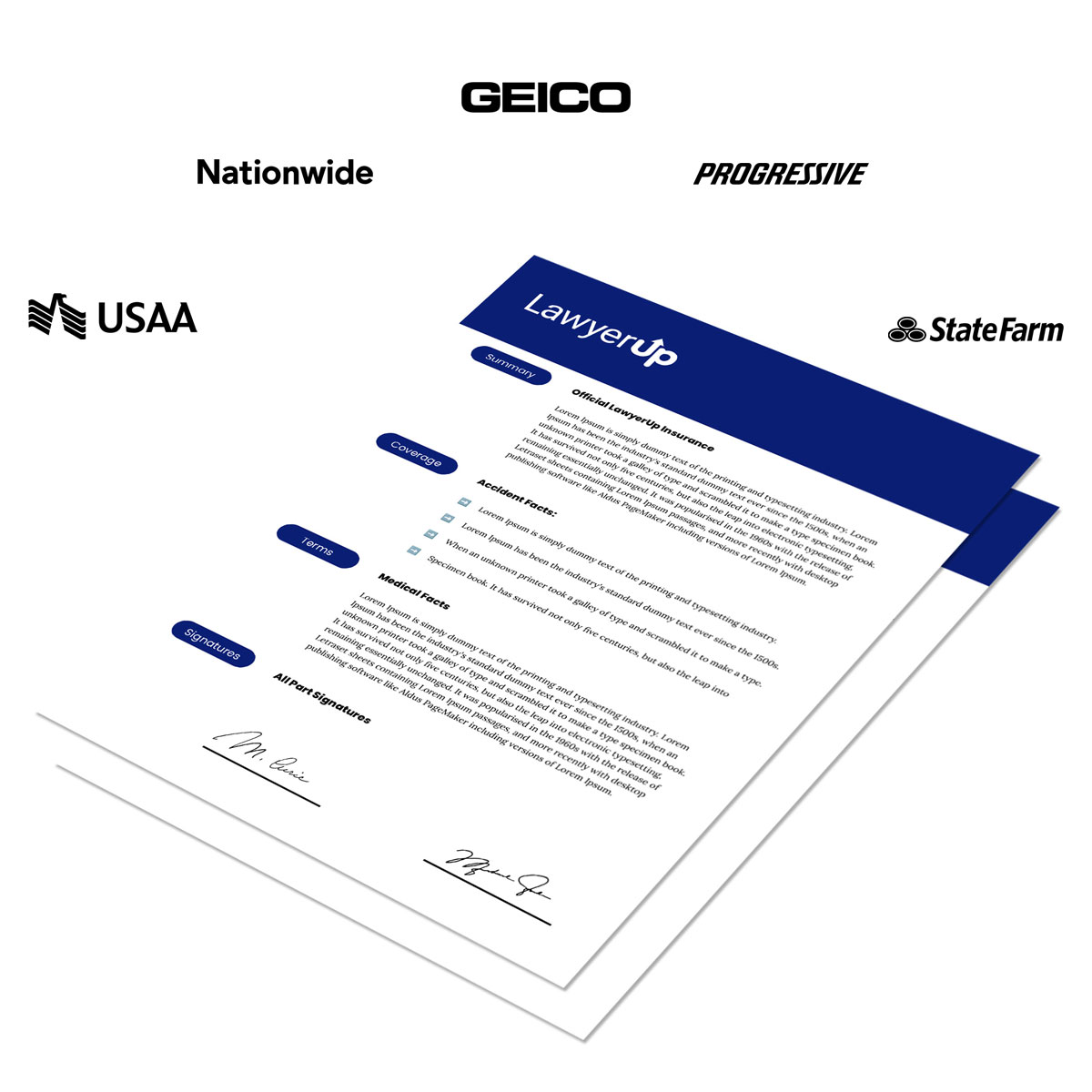Taking too long? Close loading screen.

Injured in an accident? Get paid what you deserve.
When an unexpected accident turns your world upside-down, LawyerUp® is here to set things right. Partner with America's leading injury attorneys, where your justice is our mission.
Real Victims, Real Victories
"Want a bigger payout for your injury…as fast as possible? LawyerUp’s team of elite injury attorneys secures justice for accident survivors — and you don't pay a dime until you win. With thousands of satisfied clients and a track record that speaks for itself, we’re known for our record-setting settlements and verdicts. Ready to be our next success story? Let's talk TODAY."

Brad DeBry, J.D.
Founding Attorney
Premium payouts. Swift settlements. Leading lawyers. Guaranteed.

With LawyerUp® you get:
Premium Payouts.
You’ve suffered enough — it’s time to reclaim your peace of mind with the biggest payout possible. You deserve it.
Swift Settlements.
Speed is our strategy. We streamline the legal process to get you back on your feet faster. Bills don’t wait, and neither do we.
Leading Lawyers.
Experience and passion make us America's top injury advocates. Our legal eagles don’t rest until we land you the win.





"After my accident, I felt so overwhelmed. It seemed like the bills wouldn’t stop coming. But LawyerUp stepped in, and it was like I could breathe again. They genuinely cared, and it showed in everything they did for me."

Ashley R.*
Payout $1.5 Million
Make them pay. Win every penny you deserve.
America's Top Attorneys
We lead the charge on America's fierce legal battlefield. We're the law firm other firms call for help.
100% Injury Cases
All injury cases. Injury cases only. We focus on helping hurt American residents just like you.
Win First, Pay Later
It’s simple — if we don’t win, you don’t pay. Plus, NO hidden fees or surprises along the way.
Total Transparency
We keep you in the loop at every stage, ensuring you're always informed and empowered.
Rapid Results
Time is money, especially when bills pile up. We push for fast resolutions without compromising results.
Devoted & Dependable
Our dedication to your cause is unmatched. We're more than attorneys; we're your fiercest allies.
Relentless. Respected. Recognized.
We fight for your maximum compensation. Unsure about your case? Contact us now for a FREE evaluation and secure your future today.


"Brad Debry and Riley Waddoups were incredible. I appreciated their timely and transparent communication. 100% thrilled with the results they delivered. If you need guidance with a personal injury issue of any kind, it'd be well worth your time to reach out to these competent, professional, local folks who know the ins & outs of the legal system."

Melissa T.*
Car Accident Victim
Extensive Experience fighting and winning against




We Battle, You Benefit — Insurance Companies Beware...

Make Them Pay.
GET THE MONEY YOU DESERVE, FAST.
Relentless in your recovery, we pressure insurance companies to get you paid — quickly and painlessly. And if they won't? It's time for battle.

Demolish Insurance Defenses.
WE KNOW EVERY TRICK IN THE BOOK.
Lowball settlement offers? Not on our watch. Armed with deep industry insight, we demolish their defenses and secure your max payout.

America's Hardest Cases, Solved.
WE HANDLE THE INJURIES “TOO TOUGH” FOR OTHER FIRMS.
Where others see challenges, we see opportunities. Trust us to conquer even the most complex cases — no matter how or where you’ve been hurt.

"I could not have chosen a better attorney to handle my husbands case for a fatal accident he was involved in and luckily made it out alive. Brad is a true professional. He was very reassuring and very sympathetic to our situation. I would choose Brad again. Thank you Amy Cary for always returning our calls and answering all of our questions. You guys are the best!"

Perales A.*
Car Accident Victim
ATTN: Every second counts. Claim compensation before your time runs out.
Don’t let your payout slip through your fingers. The clock is ticking, and every moment matters — schedule your FREE case review right now and get paid what you deserve.
#1 Personal Injury Law Firm
Quick wins, no delays — We work hard for your rapid payout.
Step 1
Give Us a Call
Introduce the your situation.
Step 2
Get a Free Case Review
Answer a few critical questions.
Step 3
We Get to Work
You relax, we get to work.
Car Accident
$5,000 - $2,000,000
Truck Accident
$4,000 - $2,200,000
Motorcycle Accident
$12,000 - $3,500,0000
Serious Injury
$45,000 - $5,000,000+
 |
Lawyer #1 | Firm #2 | ||
|---|---|---|---|---|
| Record Setting Wins | ||||
| Zero upfront fees | ||||
| Free Case Reviews | ||||
| Personalized attention | ||||
| Maximized payouts | ||||
| 98% win rate | ||||
| 5 Star attorneys | ||||
| Faster settlements | ||||
| Honest & transparent |

"Brad DeBry is truly caring and at the top of his game. He was purely professional and knowledgeable, answering all my questions from beginning to end. I cannot recommend the Brad DeBry Law Firm enough. Best service, best outcome, best communication, best staff. Really it couldn't get any better."

John U.*
Car Accident Victim
Our FREE FEE GUARANTEE, NO WIN, NO FEE which means ZERO RISK FOR YOU.
Pay nothing until we win. With LawyerUp®, it’s that clear-cut. Anything less than victory, and you don’t owe us a penny. Choose LawyerUp® and bet on a winning horse — get your free case review today, and let’s get you paid ASAP.

Frequent Questions...
Immediately after an accident, prioritize your safety. Move to a safe location if possible, seek medical attention, and call the police. Document the accident scene, gather witness information, and avoid discussing fault. Once you're safe, contact LawyerUp® for guidance on your next steps.
How do I pick the best personal injury law firm?
Choose a firm that specializes in injury cases, has a solid reputation, a track record of high settlements, and offers a transparent fee structure. Client testimonials and reviews can also provide insights. LawyerUp® checks all these boxes.
How much can a personal injury lawyer take from my settlement?
It will always be an upfront contract between you and the lawyer. Typically, a contingency fee arrangement ranges from 25% to 50%. The exact percentage can vary based on the complexity of the case and the state at which it is resolved.
What is the average settlement for personal injury cases?
Settlements vary greatly based on the specifics of each case, such as injury severity, liability clarity, and the involved parties. It's best to consult with an attorney to understand potential settlement amounts.
Can you tell me how to file a personal injury case?
While you can file a personal injury claim on your own, it's advisable to work with a skilled attorney. The process involves gathering evidence, determining liability, negotiating with insurers, and possibly filing a lawsuit.
Every case is unique. Contact LawyerUp® for a free evaluation to determine the validity and potential value of your claim.
How do I get the biggest payout for my injury case?
By gathering strong evidence, consulting medical experts, and working with experienced attorneys like those at LawyerUp®, you can maximize your chances of a higher payout.
What kind of injury cases do you work with?
At LawyerUp®, we handle all types of injury cases, including auto accidents, workplace incidents, medical malpractice, slip and falls, product liability, and more.
How long is the statute of limitations in my state to file a personal injury case?
In most states, you generally have four years from the date of the injury to file a personal injury lawsuit. However, exceptions exist, so consulting an attorney promptly is crucial.
How much is my case worth?
The worth of a case is determined by various factors, including medical costs, lost wages, pain and suffering, and other damages. Schedule a free consultation with LawyerUp® to get an estimate.
Ready to maximize your payout?
If you've been injured in an accident, talk to an attorney TODAY.
© 2024 LawyerUP INJURY LAW - all rights reserved. Site & Marketing by Klicker. *Client photos are illustrative only.